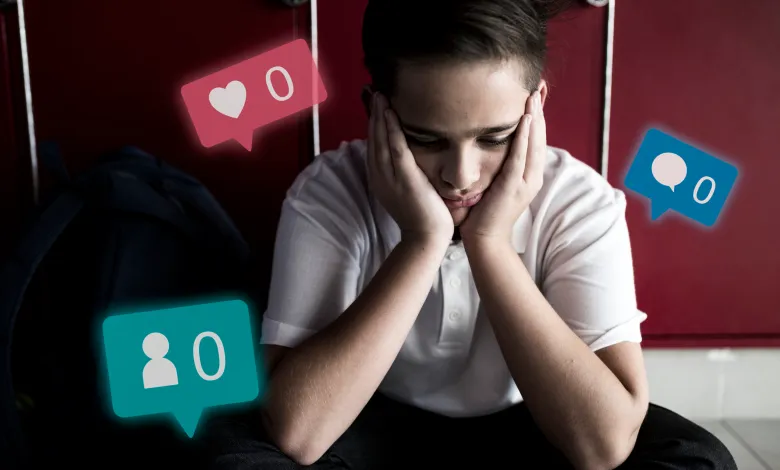“Social media is something of a double-edged sword. At its best, social media offers unprecedented opportunities for marginalized people to speak and bring much needed attention to the issues they face. At its worst, social media also offers ‘everyone’ an unprecedented opportunity to share in collective outrage without reflection.” — Roxane Gay
Like it or not, social media plays a role in our lives. How big a role? Well, that depends on the individual user. During the pandemic, while many of us were isolating at home, the social aspect of it really helped us stay connected. That said, there is a dark side to these platforms that we don’t always acknowledge.
In this month’s blog, we’re going to explore five negative and five positive aspects of social media. Armed with this information, it is our hope that users rethink the way they use these platforms and the time and space we allow them to take up in our personal and professional lives.
Let’s start with the negatives…
 5 Negative Aspects of Social Media
5 Negative Aspects of Social Media
1. Can Deteriorate Your Mental Health
*Trigger warning* This section talks about teen suicide and suicidal ideation.
While social media can be bad for anyone’s mental health, a 10-year study by BYU concluded that teenage girls are most affected by it. Many parents allow their children to be on social media around the age of 13, however, most girls this age aren’t prepared for what that’s going to mean for them. “At 13, girls are just starting to be ready to handle the darker underbelly of social media, such as FOMO (fear of missing out), constant comparisons and cyberbullying. A 13-year-old is probably not developmentally ready for three hours of social media a day.”
2. Cyberbullying
Though Cyberbullying can totally affect your mental health, we thought it deserved its own section, as this is a prevalent problem on social media – especially among young people. Once upon a time, bullying only happened on the playground and your home was a safe haven from this type of cruelty. Now, with social media bullying is infiltrating other aspects of our lives. Seven percent of Canadians experience cyberbullying, but 17% of Canadians ages 18-24 experience it. So, once again this is an issue that really affects our youth population.
3. Spreads Misinformation and Fake News
Facebook was once a place for students to share photos, plan events and keep in touch with friends. However, today it has transformed into the primary news source for many users. According to a recent study in the US, 38% of news consumers have unknowingly shared fake news on social media. And 24% said that fake news caused some confusion for them regarding current affairs. Social media algorithms are designed to deliver you content that caters to your interests and beliefs. So, you often end up in an echo chamber – being served content that reinforced your beliefs rather than challenging them. Because of this, you might see a headline that interests or excites you and you might share that, without first checking if it’s real or accurate.
4. Creates Unrealistic Expectations
Influencer culture has really changed how we view ourselves based on what we see online. A social media influencer is someone who has made it their job to share their lives online, such as the clothes they wear, the things they buy (or are gifted) and the trips they take. They project a very consumer-driven, yet glamorous lifestyle. The photos are often highly edited and carefully curated. This often creates unrealistic expectations for their followers. Young people might believe that they need to buy certain clothes and spend their hard-earned money on material things so they can replicate this lifestyle they idolize. It can be both damaging to your personal finances and your mental health.
5. It’s Addicting
While internet addiction is not formally recognized as a psychological disorder in the Diagnostic and Statistical Manual of Mental Disorders, it meets a lot of the same criteria as other addictions. Researchers conducted a study on the reward centre of the brain. The study was on how social media use affected the brain. “They found that the reward centre of the brain was often more activated after receiving positive social media feedback, such as when their peers provided ‘likes’ on Facebook posts.” The researchers note that this was a similar brain response as those who are addicted to alcohol or drugs.
While many of these statistics are troubling, social media isn’t all bad. Let’s finish with the positives, because we know that social media can add value to our lives when used responsibly.
 5 Positive Aspects of Social Media
5 Positive Aspects of Social Media
1.Connects and Reconnects People
Social networks are supposed to help us retain relationships online. And we know that this aspect of it became even more important during the pandemic, when we were at home and not allowed to gather in person. According to a Canadian Internet Use Survey, “75% of Canadians 15 years of age and older engaged in various Internet-related activities more often since the onset of the pandemic.” We can imagine that many people were using the internet, particularly social media sites to connect with loved ones. Even outside of the pandemic, many people find old friends or even long-lost family members through the help of social media.
2. Helps You Grow Your Personal or Professional Brand
One of the benefits of social media is that you have a platform to launch your brand – be it personal or professional. You get to curate your own page and show off your creativity as you reveal who you are to your followers. For professional brands, this can lead to increased awareness and that often translates into sales.
3. Sharing Your Story
Before social media, it was harder for everyday people to share their unique stories. Having a platform and a built-in audience, you can share your own personal journey using words, photos and videos. When we share stories, we feel more connected to one another. Your story might inspire someone or make someone feel less alone.
4. Helps Spread Information Quickly
While we discussed the negative aspect of this above, there is some value in the sharing of information. Quite often the sharing of a hot story can lead to more awareness and that can lead to action. Quite often social media gets ahold of major stories before news networks. For example, on January 15, 2009, an airplane made an emergency landing on the Hudson River in New York City. The first photo of the plane was taken by a citizen and uploaded to Twitter.
5. Professional Networking and Job Searching
While we often focus on Facebook, Instagram and Twitter when we think about social media, there are some other more niche sites out there that can help support your career growth. LinkedIn is a professional networking site that helps employers and employees find each other. You can grow your network, apply for jobs, build a resume and even do training using LinkedIn Learning. According to Hubspot, LinkedIn is better for generating leads. “LinkedIn is 277% more effective at generating leads than Facebook and Twitter.”
 Maintaining a Healthy Relationship with Social Media
Maintaining a Healthy Relationship with Social Media
Social media isn’t going away, but that doesn’t mean that you let it run your life. My Health Alberta shared a few tips for using social media in a healthy way. Here are a few of those points.
- Unsubscribe from accounts that make you feel bad
- Limit your time on these platforms
- Focus on your real friends – not just influencer accounts and marketers
- When your out in the world, put away your phone and live in the moment
Join Us or Hire Us
You can always reach out to Staff Shop for employment services or if you have something to share related to our blog topics.
And, if you want to learn about new opportunities, get advice from our business leaders or join our monthly book club, you can follow us on our social media sites.

